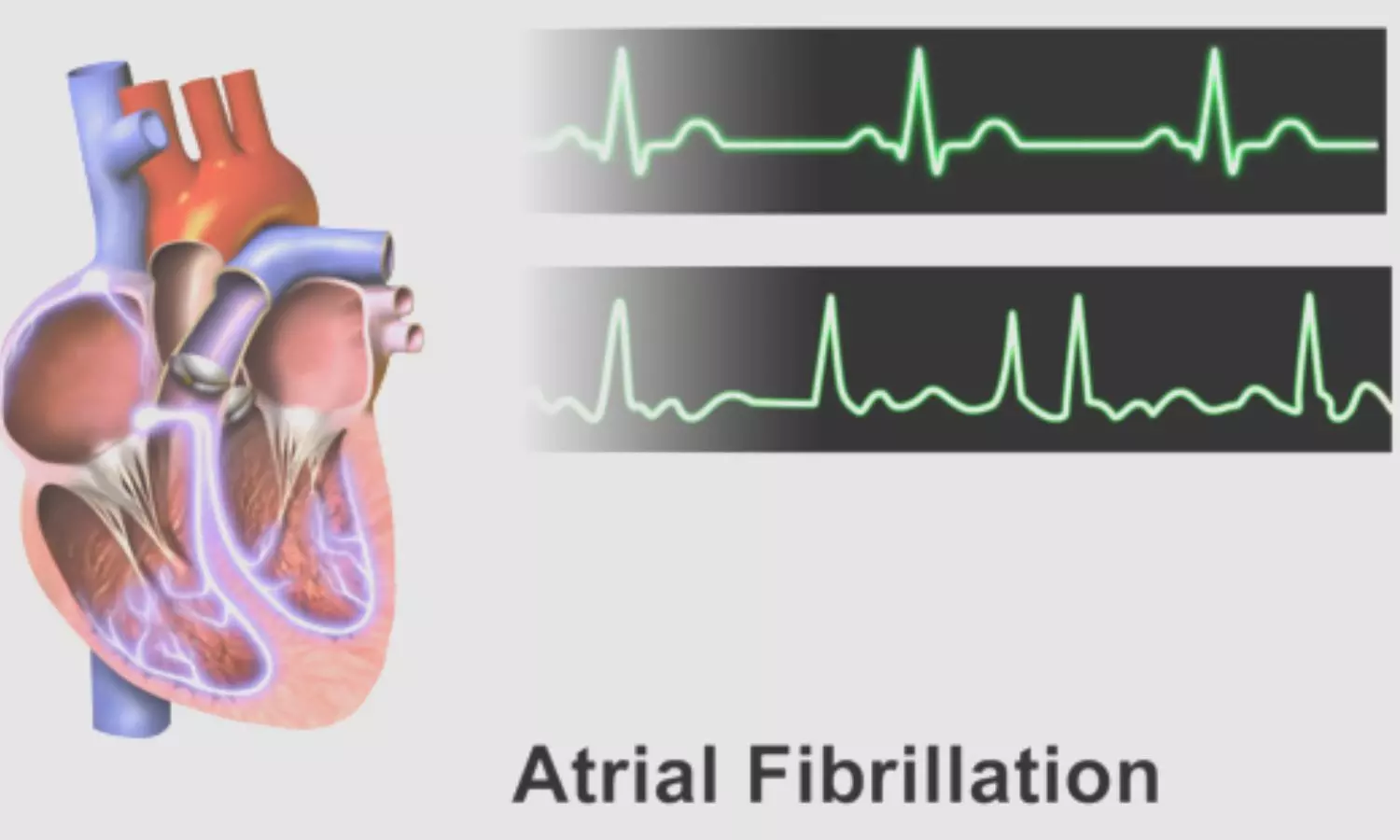- Home
- Medical news & Guidelines
- Anesthesiology
- Cardiology and CTVS
- Critical Care
- Dentistry
- Dermatology
- Diabetes and Endocrinology
- ENT
- Gastroenterology
- Medicine
- Nephrology
- Neurology
- Obstretics-Gynaecology
- Oncology
- Ophthalmology
- Orthopaedics
- Pediatrics-Neonatology
- Psychiatry
- Pulmonology
- Radiology
- Surgery
- Urology
- Laboratory Medicine
- Diet
- Nursing
- Paramedical
- Physiotherapy
- Health news
- AYUSH
- State News
- Andaman and Nicobar Islands
- Andhra Pradesh
- Arunachal Pradesh
- Assam
- Bihar
- Chandigarh
- Chattisgarh
- Dadra and Nagar Haveli
- Daman and Diu
- Delhi
- Goa
- Gujarat
- Haryana
- Himachal Pradesh
- Jammu & Kashmir
- Jharkhand
- Karnataka
- Kerala
- Ladakh
- Lakshadweep
- Madhya Pradesh
- Maharashtra
- Manipur
- Meghalaya
- Mizoram
- Nagaland
- Odisha
- Puducherry
- Punjab
- Rajasthan
- Sikkim
- Tamil Nadu
- Telangana
- Tripura
- Uttar Pradesh
- Uttrakhand
- West Bengal
- Medical Education
- Industry
New atrial fibrillation guideline adds new staged framework, upgrade catheter ablation

USA: A recent article published in the Journal of the American College of Cardiology reports updated U.S. guidelines for the diagnosis and management of atrial fibrillation (AF/Afib).In the 2023 ACC/AHA/ACCP/HRS guideline, writing committee chair Jose Joglar, MD, of UT Southwestern Medical Center in Dallas, and the team proposed a new staged framework for atrial fibrillation classification....
USA: A recent article published in the Journal of the American College of Cardiology reports updated U.S. guidelines for the diagnosis and management of atrial fibrillation (AF/Afib).
In the 2023 ACC/AHA/ACCP/HRS guideline, writing committee chair Jose Joglar, MD, of UT Southwestern Medical Center in Dallas, and the team proposed a new staged framework for atrial fibrillation classification. The guideline emphasizes a rhythm control strategy similar to what is recommended in the most recent AF guideline from the European Society of Cardiology (ESC).
The recommendations also highlight the need for risk factors and lifestyle modification in addition to medical treatment. In this Guideline-at-a-Glance, practice-changing recommendations from the guideline are highlighted to accelerate adoption into clinical practice.
Afib catheter ablation gained a broader class I recommendation from the American College of Cardiology and American Heart Association (ACC/AHA) for improving symptoms in people with all subtypes of symptomatic Afib when antiarrhythmic drugs have not worked or been tolerated.
For selected individuals with symptomatic paroxysmal Afib wishing to improve their symptoms and prevent progression to persistent Afib, first-line use also gained the same class I rank.
The guideline document also laid out a classification system for the evolution of this progressive disease:
- Stage 1 (at risk for Afib): the presence of risk factors such as hypertension, obesity, genetics, sleep apnea, and older age.
- Stage 2 (pre-Afib): evidence of structural or electrical findings such as atrial enlargement and atrial flutter.
- Stage 3 (Afib): substages from paroxysmal Afib (3A), persistent Afib (3B), and long-standing persistent Afib (3C) to successful Afib ablation (3D).
- Stage 4 (permanent Afib): no further attempts at rhythm control or monitoring following a patient-clinician discussion.
Across all four stages of atrial fibrillation, modifiable risk factors should be treated, whether with medications or lifestyle changes. Heightened surveillance may be considered starting in stage 2 pre-Afib, but stroke risk assessment and therapy should not be introduced until stage 3 Afib.
These and other recommendations from the new guideline supplant the 2014 Afib guideline and 2019 guideline-focused update.
The research team put a new emphasis on a healthy lifestyle to prevent progression or lessen the burden of Afib. Overweight and obese patients should target 10% weight loss (class I recommendation).
People with Afib should perform 210 minutes of weekly moderate-to-vigorous exercise (class I). Also recommended were tobacco cessation for smokers with a history of Afib (class I) and reduced alcohol consumption in people with Afib (class I).
In contrast, abstinence from caffeine was deemed to be of no benefit in Afib, though it may lessen symptoms in patients reporting caffeine as a trigger for Afib symptoms (class III).
"There is a need for future research to include better individualization of atrial fibrillation and stroke risk, as well as more clarity on the role of general Afib screening and the magnitude of subclinical Afib that would merit stroke prevention therapy," the study stated.
Reference:
Joglar JA, et al "2023 ACC/AHA/ACCP/HRS guideline for the diagnosis and management of atrial fibrillation" J Am Coll Cardiol 2023; DOI: 10.1016/j.jacc.2023.10.021.
MSc. Biotechnology
Medha Baranwal joined Medical Dialogues as an Editor in 2018 for Speciality Medical Dialogues. She covers several medical specialties including Cardiac Sciences, Dentistry, Diabetes and Endo, Diagnostics, ENT, Gastroenterology, Neurosciences, and Radiology. She has completed her Bachelors in Biomedical Sciences from DU and then pursued Masters in Biotechnology from Amity University. She has a working experience of 5 years in the field of medical research writing, scientific writing, content writing, and content management. She can be contacted at editorial@medicaldialogues.in. Contact no. 011-43720751



